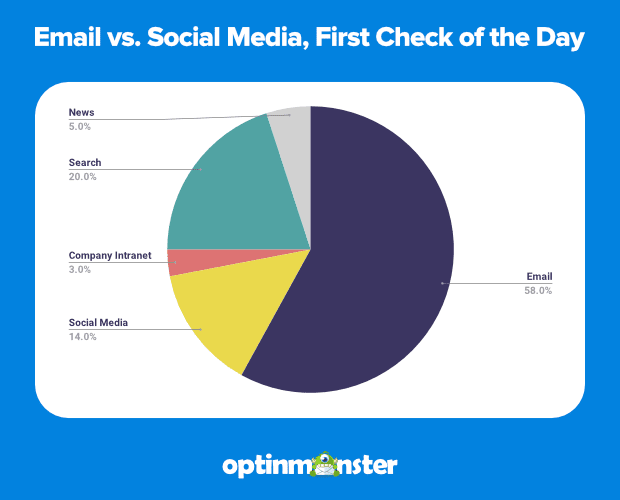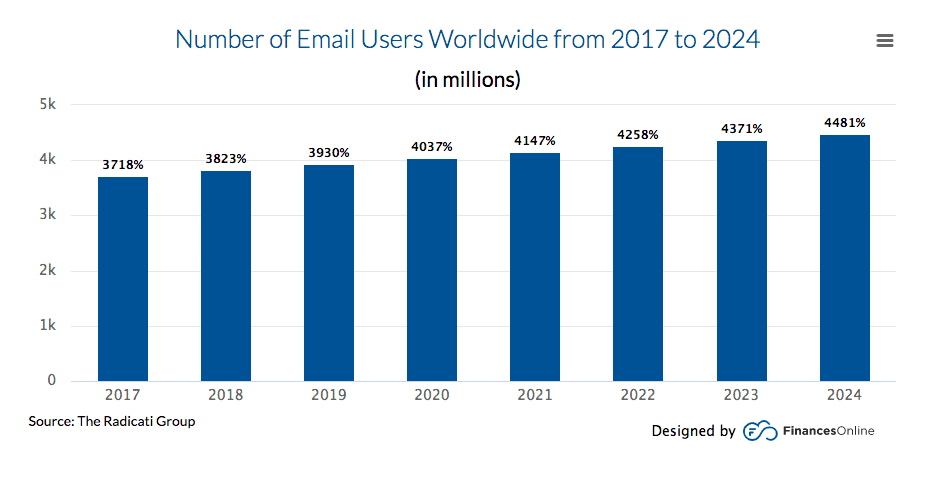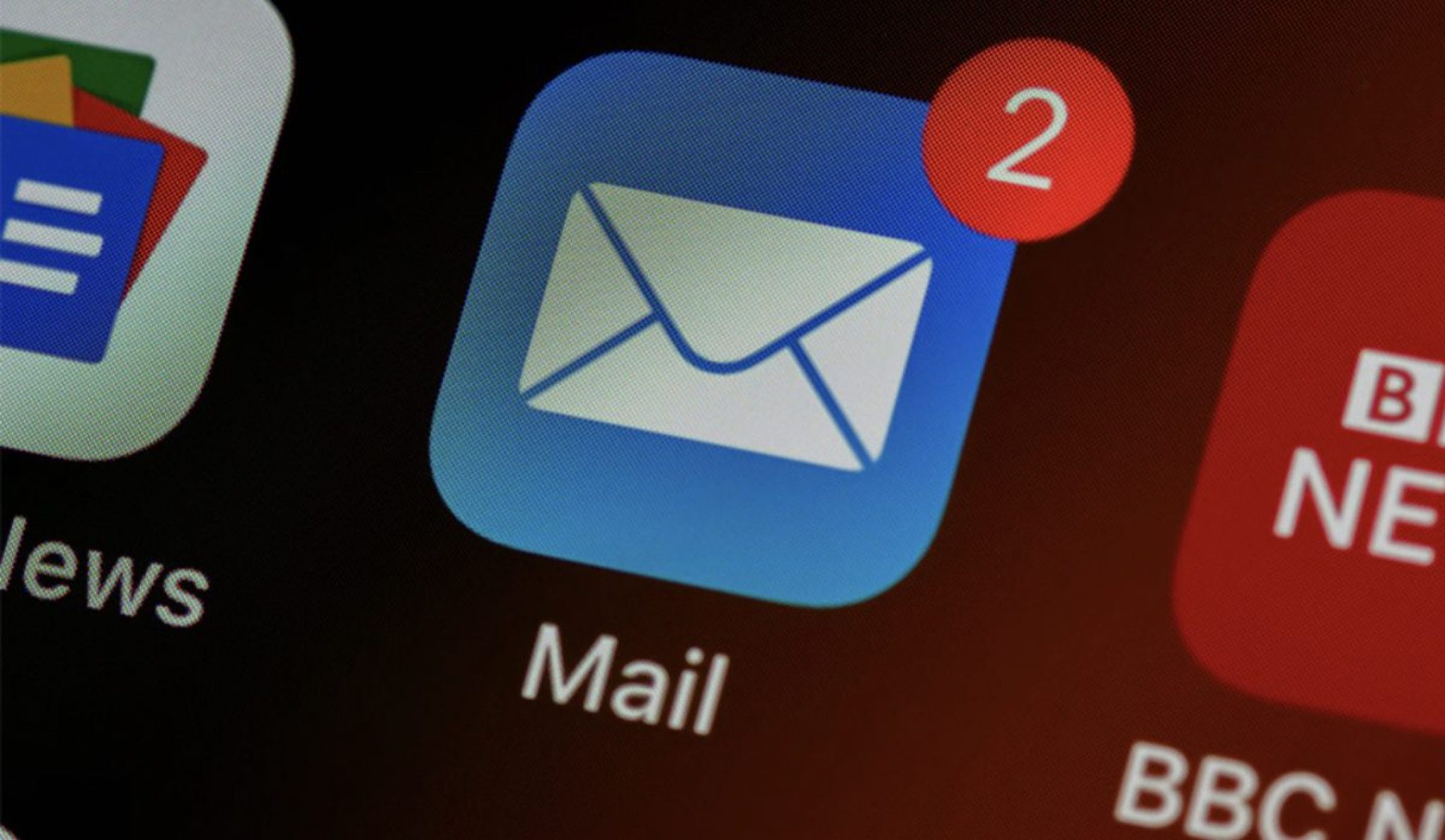How long can you go without checking your email?
a.) A week
b.) A day
c.) An hour
d.) 10 minutes
It’s almost impossible for anyone to go even a few hours without opening their inbox, especially now that email is as mobile as we are with phone apps, smartwatches and push notifications alerting us to every inbox item, no matter the time or place.
Whether you’re logging in to read important messages for work or looking to see updates on your latest online purchase, checking your email has now become part of a daily routine.
99% of online users check their emails every day and almost 60% open their email accounts first, before visiting any social media platform.

58% of online users open email before anything else. That’s a huge statistic and one that small businesses can utilise when creating their marketing and communication strategies.
What makes this work is that emails, unlike other online content, are personal. It’s about them and their day. Business owners can use this understanding to create an email campaign that addresses customers directly (even by name) and delivers what they need.
There is a personal touch that makes customers feel that their interests and concerns are being acknowledged by the company. It also creates a rapport between the customer and the small business, which can later build trust and convert into leads.
That’s what makes email marketing for business so lucrative. Not only has it stood the test of time (other platforms come and go, but email is still here), it helps you create a more personal connection with your audience.
Since it costs next to nothing to set up an email account and send messages, emails are a cost-effective medium to reach your customers.
But there’s more to email marketing than just knocking out some copy and hitting send, you need to have a solid content plan, a standard schedule for emailing and a well-formed strategy to effectively communicate your message to your audience.
What is email marketing?
Email marketing is a digital marketing strategy that uses emails to inform a wide range of people about your small business. When used correctly, it can convert prospects into loyal customers and potentially increase awareness and sales for your products and services. Looking for strategies and other services for making high-quality content? Visit copywriting services.
To effectively utilise email marketing, small business owners must take note of the two types of emails:
- Sales emails – These refer to emails sent in bulk to customers. It’s often a sales pitch to further promote the company’s products in an effort to earn more revenue.
- Cold emails – These are more personalised emails that address a specific interest or question that a customer may have. It’s usually created to foster a relationship with customers rather than just convincing them to buy a product or service.
Cold emails are a good way of drawing attention to your brand. Because it discusses a topic that concerns the email recipient in detail, it’s able to pique their interest and entice them to want to know more about the business.
You can even use storytelling to further engage your target market and relate to them on a personal level. Doing this can make your email stand out from competitors (who use the generic spiel to advertise their products) and make it more memorable for the customer.
Sending regular emails will also allow you to develop a better working relationship with customers and strengthen brand recognition.
Emails also surpass other marketing techniques and digital platforms such as search engine optimisation (SEO), social media and traditional advertising in terms of usage. Its figures continue to grow and by the year 2024, email is projected to have 4.5 billion users worldwide.

These findings show that email marketing is a worthwhile investment to consider and one that won’t phase out or lose traction in the near future.
Why is email marketing effective?
According to Forbes, email marketing receives a Return on Investment (ROI) of $42 USD for every dollar spent! That’s considerably more effective than any other marketing tactic.
The reasons why email marketing works so well are multi-layered. We’ve already mentioned they are personal and highly relatable, but other factors you need to take into account when creating your email campaign for your small business’ marketing strategy include:
- Emails deliver benefits to customers instantly – Customers are updated the minute the email is sent through, allowing them to use the given information to their advantage. A good example of this is when supermarket shoppers use an email coupon or voucher to get a discount for their purchases. These emails not only provide customers with an incentive to buy, but also gives them a reason to subscribe to your email database.
- Emails can be accessed on almost any device – Emails are highly accessible. They can be viewed on mobile phones, tablets and watches. This makes it easy for customers to check their inbox immediately and lets you get your message across quickly and efficiently.
- It’s perfect for small businesses – Email is free and available to everyone. Customers already have the platforms and accounts they need, there is nothing you need to provide or invest in to get your email communications firing. It’s perfect for small businesses that don’t have big budgets for fancy technology or exclusive apps.
All of this can contribute to an increase in better brand recall, which can generate leads and sales for your small business.
Benefits of email marketing for business
Small businesses will find multiple advantages from email marketing strategies. These benefits include:
- Creating a loyal customer base – Emails are personalised and can establish an emotional connection between the customer and the brand. This fosters a better customer-seller relationship, building trust and loyalty.
- Fast and affordable campaigns – You don’t need to invest in additional programs to get started, just by having reliable internet and an experienced writer you can add email marketing into your business strategy.
- Credibility and brand recognition – By attaching well-researched blogs or informative videos to your emails, you add value to the messages you send to customers. This added content strengthens your credibility as an expert in your industry. It also makes your customers excited to subscribe and receive emails from you because they know they can rely on you to deliver regular, good quality content.
- Easy to measure click-through rates and traffic – You can monitor the clicks made through your emails by embedding click tracking URLs or incorporating lead scoring techniques on your email database. Applying these two methods enables you to easily measure the website clicks made through your email to see how well your email marketing campaign is doing.
- Targeted and personal messaging – Because emails can be customised per customer, you’re able to group and address specific questions or interests your recipients might have. This gives customers value-added content that will encourage them to subscribe to your email updates.
When done correctly, small businesses can use email marketing to see an ROI across a number of different KPIs including customer satisfaction, conversions and brand awareness.
Effective email marketing examples
Want to see this at work in the real world? Here are some great examples of effective email campaigns that have given these businesses an edge over their competitors.
1. Boxycharm
Boxycharm enhanced their makeup and beauty sales with eye-catching subject lines that included colourful visual elements, like emojis. As well as encouraging readers to open the message, they were enticed to stay on a page with engaging photos and animated arrows directing them to continue scrolling for a surprise or reward.
Because of this, they were able to maximise website click-throughs and drive huge volumes of traffic back to their web page.
2. Airbnb
Holiday rental company Airbnb taps into customer website searches to create a personalised email. So if an online user types in “places to stay in Melbourne”, they receive an email related to that search and possible listings to suit their travel needs.
Because of this, they’re able to appeal to their customer’s preferences and create an email message that’s unique to what they’re looking for.
3. Emailmonks
Emailmonks made emails fun with interactive games related to their current offering set within the email body. It got people excited about the next email and the game it contained and gave people what they needed, a five-minute break from routine.
We can see here that email offers the flexibility to show the strength of a business, no matter how different they may be, or how diverse their marketing strategies may be, email can accommodate. Adding these elements, or one of your own, can make your email stand out and get more people interested in clicking and subscribing to your email updates and newsletters.
At the end of the day, well-executed email marketing allows you to make the most out of your content marketing efforts and increase brand awareness, customer loyalty and conversions.
By creating a solid content plan and establishing a consistent schedule for emailing you are set to get started. Be sure to use creative and engaging email marketing techniques and hire a qualified writer or content team to deliver your messages. When email marketing is executed correctly, small businesses are able to maximise email message benefits like increased brand recognition, credibility and click-throughs that can see a significant increase in your business sales.

